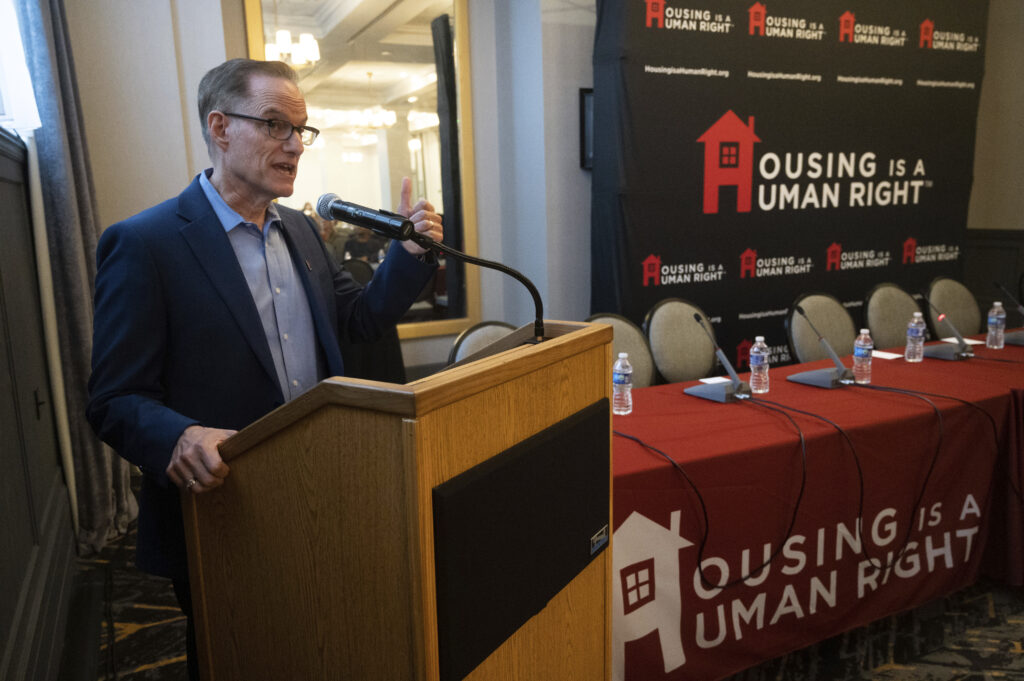California’s ballot wars have often featured monied interest groups and their high paid political mercenaries taking each other on with a veritable carpet-bombing of expensive TV ads. But a ballot measure like this — one to outlaw a single person — is highly unusual. It dispenses with pretense and puts the target right on Weinstein’s back, with supporters unveiling an early November 2024 slogan: “Stop the Weinstein scam.”
Leading the charge is the California Apartment Association, the nation’s largest statewide association for rental owners and managers. Among those joining the coalition are Assemblymember Evan Low (D-Campbell), who also is helping the ballot push to rescind California’s Proposition 8 same-sex marriage ban from 2008 that was struck down in federal court in 2010.
“It’s common sense: public tax dollars meant for patients should be spent on patients,” Low said.
Low previously authored legislation to prohibit AHF from using state and federal funds or money from a federal drug-discount program for housing-related ballot measures or to bankroll litigation to gum up housing projects. Others have urged state investigations into the foundation’s use of savings from the drug-discount program that is designed to help poor patients.
Weinstein did not immediately respond to a request for comment on Wednesday.
Although he’s enjoyed few, if any, electoral successes in the Golden State, Weinstein’s spending alone on rent control, a housing development freeze, drug pricing and mandating condoms in adult films has made him a force to be reckoned with. Some of California’s leading politicians and interest groups see him as an uncompromising pugilist with few allies outside his own organization.
For more than a decade in Sacramento and Los Angeles, they’ve complained that he’s exploited a loophole allowing him to use AHF as his own political piggy bank. But he’s kept spending, and fighting. Weinstein, once a candidate for Los Angeles City Council, has mostly embraced his outsider role, arguing he’s not trying to win a popularity contest and holding himself out as a one-man army willing to not only touch third rails but crash right through them.
Weinstein mercilessly attacked drugmakers. He waged a public battle against the pill to prevent HIV infection. He’s fought landlords with repeated attempts at expanding rent control in California.
The new anti-Weinstein initiative — named the Protect Patients Now Act — would target Weinstein over how he amasses the money he spends on campaigning. AHF relies on the decades-old federal drug discount program designed to help hospitals and other healthcare nonprofits treat low-income patients. Known as 340B, it allows the organization to purchase prescriptions at a deep discount and charge public programs the standard amount. AHF has long argued that it spends 340B funds for their intended purpose and that the foundation is allowed to spend a certain percentage on political activity.
But its spending on campaigns, a growing portfolio of property and to bring in paid consultants such as former California Senate Pro Tem Kevin de León, now a member of the Los Angeles City Council, has drawn persistent scrutiny.
The new ballot measure is highly targeted. Specifically, it would apply only to drug program participants that have spent more than $100 million on issues other than direct patient care and have 500 or more health and safety violations on their low-income properties. POLITICO could find no other organizations that match that criteria.
The measure would require AHF to spend 98 percent of its taxpayer-generated revenues on direct patient care. It also would seek to prevent the group from overcharging government agencies for prescription drugs.
If AHF violated the new law, the state could strip its nonprofit status and make the organization ineligible for taxpayer dollars. Proponents say their internal polling on the measure conducted in July by FM3 Research found a solid majority supporting the proposal, with a quarter opposed at the onset.
Weinstein has been the subject of scorn in political circles and an enormously frustrating figure to critics, some of whom he’s put on notice with barbed mailers. Still, he’s far from a household name across a state of nearly 40 million. In April, POLITICO was the first to report that he’d taken the unusual step of paying $2 per signature for a letter to Gov. Gavin Newsom that demanded he do more to help lower the cost of housing and urged him to at least stay neutral on AHF’s rent-control measure.
Ethics experts at the time contended Weinstein and AHF should have been transparent about paying people to get signatures for the draft letter, which referenced by name the proposed rent-control ballot initiative. AHF defended its use of the paid letter.
The governor himself has largely ignored Weinstein while taking aim at AHF’s measures that lost big at the ballot box. Newsom opposed Proposition 21 in 2020, suggesting it was unnecessary since California had already passed sweeping rent control. Newsom similarly opposed Weinstein’s Proposition 10 in 2018, saying it may have unintended consequences on housing production that could be deeply problematic for the state.
Weinstein blamed Newsom for his setbacks, and has offered sharp rebukes about the governor’s tenure, including his handling of the pandemic.
The California Apartment Association and others involved in the latest Weinstein broadside pointed not just to the past statewide ballot losses, but to other activities as well. Weinstein sued California over affordable housing laws and was flagged by state officials for alleged improper negotiating tactics. Weinstein countered the state was retaliating against him for pushing for higher rates.


